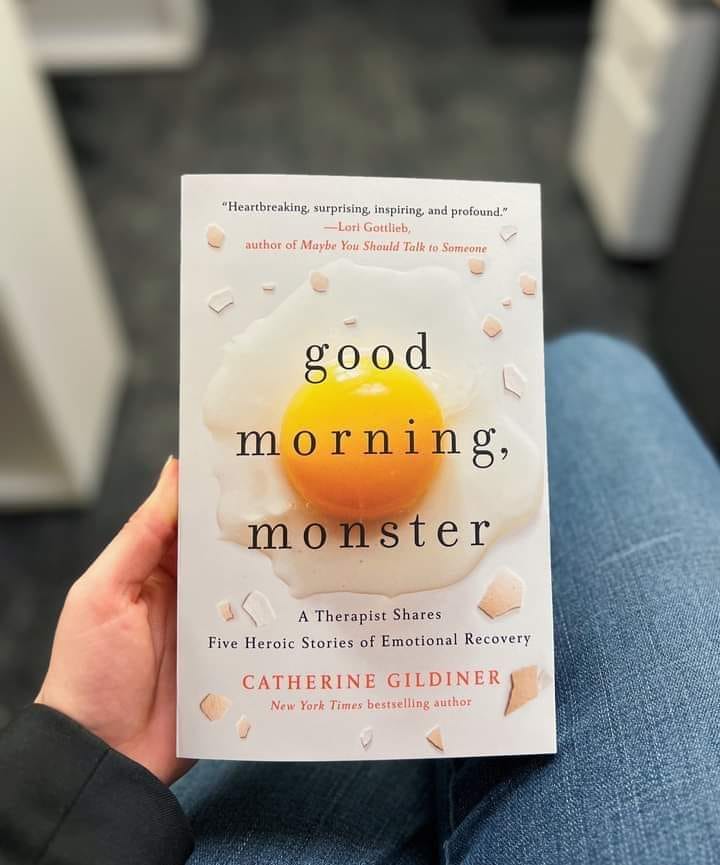Good Morning, Monster is a powerful and thought-provoking memoir written by Karla Sorenson. In this book, Sorenson, a licensed psychotherapist, shares the real-life stories of individuals suffering from severe mental health issues, chronic trauma, and psychological distress. The book delves into her experiences as a therapist working with some of the most challenging cases—people whose pasts are filled with deep trauma, abuse, and emotional suffering.
While the title Good Morning, Monster may sound playful, it actually refers to the complex, often haunting aspects of mental health struggles. The “monster” in this case represents the internal struggles and emotional turmoil that many people face—whether it’s depression, anxiety, PTSD, or other mental health challenges.
Key Themes and Insights from Good Morning, Monster:
- The Human Experience of Trauma:
- Sorenson takes readers through the stories of her patients, showing how past trauma often manifests as deeply entrenched emotional and psychological “monsters.” These monsters are not literal, but they take on a life of their own in the minds of those suffering.
- The book emphasizes how trauma shapes people’s behaviors, decision-making, and how they relate to the world around them.
- Healing Through Therapy:
- One of the central themes of the book is the power of therapy. Sorenson walks through the ways in which therapy can provide not just coping mechanisms but also pathways to understanding oneself, working through pain, and gaining freedom from past traumas.
- It’s a raw exploration of how patients struggle to confront their demons and how therapy can help them achieve healing over time.
- The Importance of Empathy and Trust:
- Sorenson’s work is built on a foundation of trust and empathy. She discusses the importance of forming deep connections with clients, creating a safe space for them to express themselves without judgment. This trust is the cornerstone of healing, and her story highlights how it can be transformative when patients feel understood and supported.
- The Complexity of Mental Health:
- Good Morning, Monster doesn’t offer simple solutions or wrap everything up neatly. It acknowledges the complexity of human behavior and the many layers that contribute to mental illness. People with trauma often face immense difficulty in recognizing their own worth and power.
- Sorenson also touches on the stigma surrounding mental health, showing how individuals feel ashamed or isolated in their struggles and how critical it is to normalize mental health care.
- The Role of Therapy in Transformation:
- Sorenson’s patients are not the only ones who undergo change. As a therapist, she also learns and evolves through her experiences. The work can be grueling, but it’s also deeply rewarding to see people confront their darkest moments and emerge stronger.
- The book underscores how personal transformation is a two-way street, and healing is a joint effort between therapist and patient.
- Hope and Redemption:
- Despite the intense and often painful subject matter, the book ends on a hopeful note. It showcases the resilience of the human spirit and the possibility of change, even in the face of seemingly insurmountable obstacles.
- Good Morning, Monster reminds readers that healing is a long and often difficult journey, but it is possible. Each story serves as a testament to the strength of individuals fighting to regain control over their lives.
Why You Should Read Good Morning, Monster:
- Insight Into Mental Health: For anyone interested in understanding the depths of mental health struggles and the complexities of trauma, this book offers valuable insight from a professional’s perspective. It’s not just a series of patient stories; it’s a clinical, yet deeply empathetic, exploration of what happens in the mind during psychological distress.
- Inspiration: The stories within the book are inspiring in that they demonstrate the courage and resilience of individuals who have experienced immense pain and are still working toward healing. Their journeys can give hope to others going through similar struggles.
- A Deeper Understanding of Therapy: If you’ve ever wondered what therapy is really like or how it works in practice, Sorenson’s firsthand account shows the challenges, rewards, and nuances involved in therapeutic work. It’s not a magical, instant fix—it’s a slow, sometimes painful, but ultimately worthwhile process.
- A Challenge to Mental Health Stigma: The book aims to reduce the stigma surrounding mental illness by showing that everyone is capable of healing. People suffering from psychological distress are not broken or weak—they are individuals with stories, and often, with deep-seated trauma that needs to be addressed with compassion and care.
Final Thoughts:
Good Morning, Monster is a compelling and emotionally charged read. It blends the personal stories of patients with the professional insights of a seasoned therapist. The book is an invitation to reflect on the complexity of mental health, the importance of empathy, and the incredible human capacity for healing and transformation.
If you’re looking for a book that explores the darker sides of the human experience but ultimately offers hope and redemption, Good Morning, Monster is a powerful choice.
